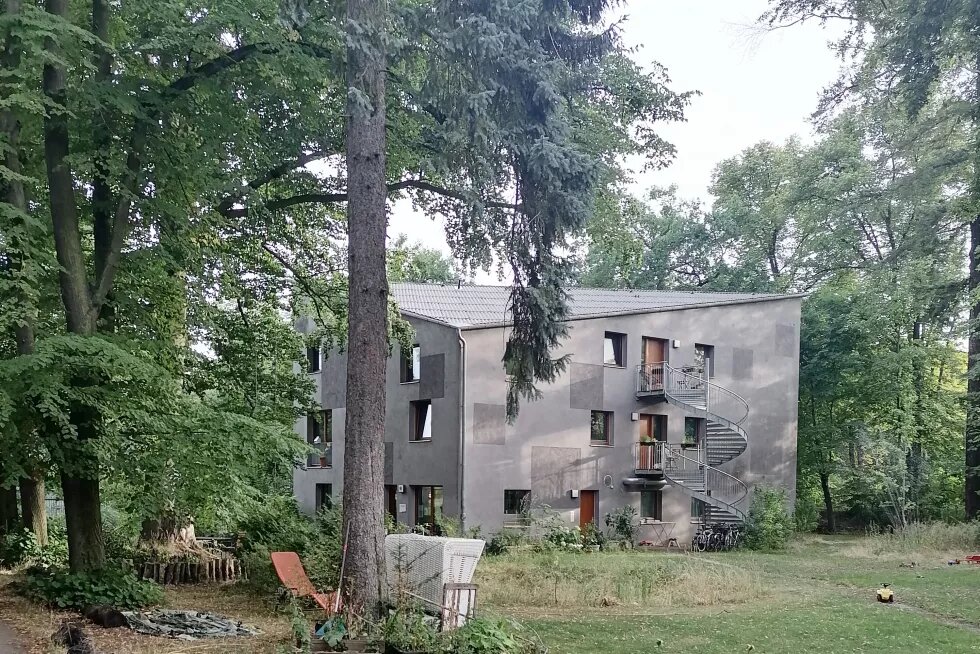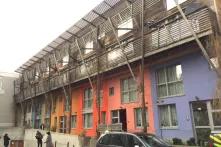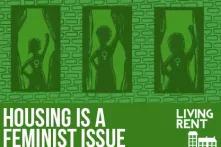Urban gentrification and the skyrocketing of rental and purchase prices are phenomena that are intensifying in all Greek cities. As a result, citizens are being forced out of their homes or have to pay larger amounts of money to continue living in the house they used to live in. This has happened to me and many people I know. In the solidarity group “Pervolarides Thessalonikis”, of which I am a member, we are confronted with this from time to time when we try to find space for our activities. The general conclusion is that every year it gets worse and worse.

The reaction can be individual, with citizens trying to find the best solution for themselves. But it can also be collective, by putting pressure on local authorities to rein in real estate prices, or by creating a community of citizens that will address the issue of homelessness through mutual aid.
My own adventure with cooperative housing started in August 2019, after visiting the premises of the cooperative housing project Projekthaus Potsdam and its sister Social Solidarity Economy (SSE) project Inwole in Potsdam, Germany. What I saw there prompted me to write my master’s thesis on these two projects, as part of the Open University of Greece’s postgraduate programme on SSE.
What is cooperative housing?
Cooperative housing is the practical expression of the decision of a group of people to live collectively under a common roof and according to rules that they themselves formulate. This living together can take the form of living in autonomous apartments in a building or in autonomous rooms in a house, with all the other spaces being shared. This accommodation may be rented, purchased, or acquired through a loan of use.
In the particular model I have lived and studied, members pay rent for the autonomous apartment in which they live. This amount is used to repay the loan for the purchase of the building, home, or lot and also to repair and improve the infrastructure. These ventures are characterised by the fact that the asset is owned by a legal entity, and the rent-paying tenants will never acquire ownership, even when the loan is repaid. I understand that at first glance, this may not make sense for a country like Greece, which is known for its very high home ownership rate and where the concept of “owning the roof over your head” prevails. So how does such a model work, and how could it be applied to Greek reality?
The Projekthaus Potsdam example
In the Projekthaus Potsdam, 31 people aged from zero to 53 years old live together in autonomous apartments, creating a self-organised living, working, and cooperating space.
The property was acquired in May 2005, after ten years of preparation and the development of a project plan. The financing came from a bank, which was not easy since 18 years ago the concept of cooperative housing was not very well known and the Projekthaus partners were mostly unemployed, students, or precariously employed people. The project started with one building, which was purchased by the municipality along with the land. Currently, there are three buildings with apartments and three more with offices and workshops.
51% is held by the group of people who founded the cooperative housing project (the cooperative) and 49% by the Mietshäuser Syndikat.
Mietshäuser Syndikat
Projekthaus Potsdam is under the auspices of the Mietshäuser Syndikat (MHS), a cooperative, non-commercial investment company in the legal form of a Limited Liability Company (LLC), which has been supporting the creation of cooperative housing projects since 1992 by providing expertise, legal support and networking with similar schemes.
Up until September 2022, 177 cooperative housing projects had been set up across Germany by 20 initiatives, with more than 3,800 tenants. The project has also found imitators in other countries, including France, Austria, Switzerland, the Czech Republic, and the Netherlands.
As stated in its statute, the purpose of the MHS Syndicate is “the solidarity cooperative in the field of apartments and buildings. It is the common purpose of all members to create self-organised structures for the support and political implementation of the demands for decent living spaces, for a roof over our heads, for everyone”. The essence of the project therefore revolves around the triptych: common property, self-organisation, solidarity.
The Syndicate aims at:
- the withdrawal of residences from the capitalist real estate market,
- the transfer of solidarity best practices from the strongest to the weakest projects within the MHS network,
- setting an example for people or groups in order to open up the debate on cooperative housing—a housing that is not just “a roof over one’s head”, but one that is safe, with adequate lighting, heating, and privacy.
With each new cooperative housing project that is implemented, one more property is withdrawn from the real estate market and transferred to the “Commons”, strengthening specific characteristics of social organisation, such as trust, social rules, self-regulation, and democracy.
The people I met through the project
The people I have spoken to and been fortunate enough to live with see housing as a common resource, one that they consider their duty to protect and upgrade through democratic processes. There is a sense of community that comes from regular assemblies where issues such as rent levels, needed building repairs, participation in events, support for members, etc. are decided. The space they live in is theirs, although they do not own it individually. The members of the collective lead their own lives (work, studies, family, hobbies, etc.). At the same time, however, they see themselves as acting members of the community. Their action has two axes: First, they participate in the decision-making process regarding the direction of their cooperative community, as expressed in the assembly that takes place every other Wednesday. Second, the reflection of their collective in the neighbourhoods of Potsdam through the participation of its members in festivals and political and social processes within the city and beyond.
A SSE project within Projekthaus Potsdam
The “sibling” of the cooperative housing project, Inwole, is a Social Solidarity Economy (SSE) structure. On the premises of Inwole, there are courses in sewing, carpentry, bicycle repair, ceramics, etc. Inwole rents the course spaces from the Projekthaus, which provides an income for the cooperative housing community, and some of the Projekthaus tenants work at Inwole, which has been a goal of the project right from the start.
These people wish to live differently, beyond exploitative patterns of housing and work: in solidarity, in mutual aid and support, in co-decision and co-responsibility for the space in which they live and work.
Why have I decided to deal with this matter?
On a more personal note, I, like many other people, experience my daily life in a constant state of division. On the one hand, the life I lead (work, fatherhood, and in my minimal free time, volunteer work with a smattering of social and personal life). All this comes with a generous dose of loneliness, pressure, and uncertainty.
On the other hand, there is the life I would like to live: With camaraderie and coexistence with those who share our political and social values, without necessarily agreeing on everything. With those who we shall act together (when we want to) and retreat to our private space (when we feel like it). With human companions who will take care of each other, love each other, fight with each other, and take care of each other’s children and dogs (because we need our own personal space and time, too). And who, when the need arises (which it will, there are many times), we will march with.
With lower rent (according to the international experience of similar projects), with many needs covered by the collective itself, and with less pressure for long hours of work, there is more free time for rest, recreation, company, and engaging with the commons.
With a House that is open to other people and collectives to discuss and eat at our large table (yes, we will have a large table!), the aim of creating a laboratory of solidarity and producing a different cohabitation model, one that radiates solidarity and companionship, can be fulfilled.
That’s why I’m jealous every time I’m at the Projekthaus Potsdam, because we don’t have anything similar in Greece (yet). And every time I am alone or with the group of the “Pervolarides Thessalonikis” in the Projekthaus and Inwole, I feel incredible joy and peace.
But do these things happen in Greece?
It seems that there is a dynamic of people who have been discussing cooperative housing for some years, both individuals and collectives, such as the Cohab group, which, with the support of the Heinrich Böll Foundation, is in the process of carrying out a major research on cooperative housing, the main axes of which are finding funding for the project, creating a statute or vision, finding a property, and architectural design.
In my view, two things are necessary for the introduction of cooperative housing in Greece: first, the creation of the above-mentioned tools; and second, a broader public awareness through events and workshops in order to find other people who will complement the effort and try to implement it.
In the current conditions of exploitation, the demand to live “otherwise” arises from civil society. And this “otherwise” can include where we live, with whom, and how. It is time to start answering these questions.


